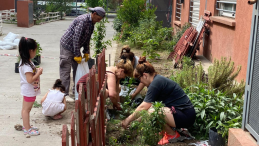Dependency on the long-distance supply chain for food can be problematic. Disruptions along the global supply chain, e.g., due to pandemics such as COVID-19 or conflicts in areas of major production, can impact food security. Producing food locally can reduce the vulnerability to and impacts of such disruptions.
Urban and peri-urban agriculture (UPA) is a strategy to produce food in a setting close to urban residents. In addition to diversifying urban food consumption, UPA can reduce greenhouse gas (GHG) emissions indirectly by shortening the food supply chain or directly by promoting carbon sequestration. Also, UPA can regulate the local climate, contribute to soil conservation, and enhance biodiversity. These ecosystem services make UPA an attractive solution to mitigate and adapt to climate change.
However, the role and potential of UPA in climate change mitigation and adaptation are not yet well investigated. It is necessary and important to take the unique factors of the urban settings into consideration, e.g., urban heat islands, local food demand, water availability, and soil properties.
This research aims to develop adaptive measures to minimise trade-offs and optimise co-benefits of UPA through a better understanding of their impacts on key ecosystem services resulting from climate and land-use change scenarios. The outcome of the project will provide science-based evidence to inform decision-making.
This project is funded by the Saxon State Ministry for Science, Culture and Tourism (SMWK).





